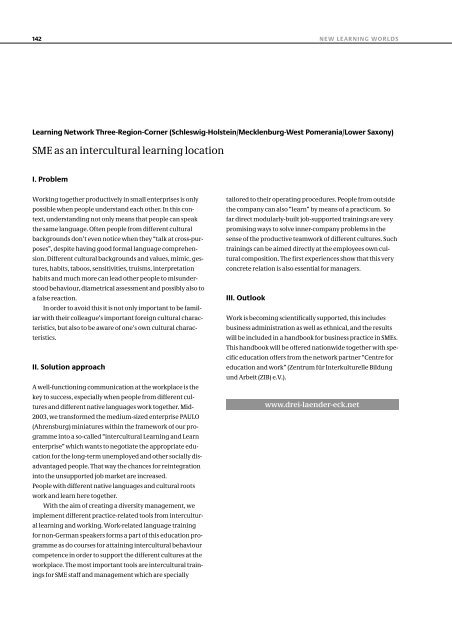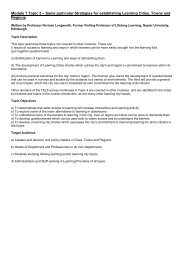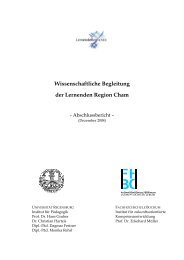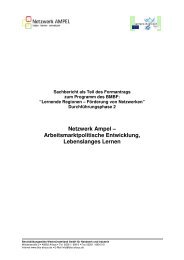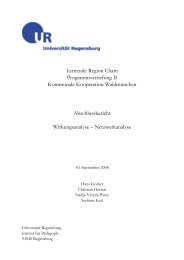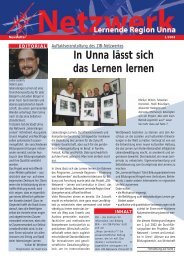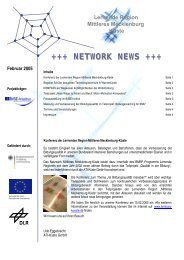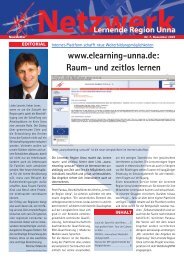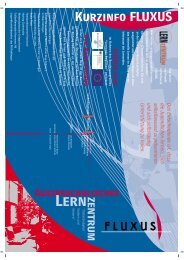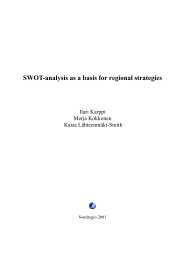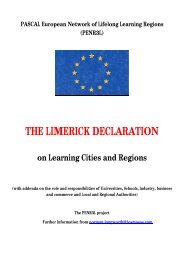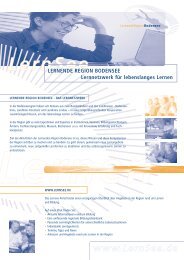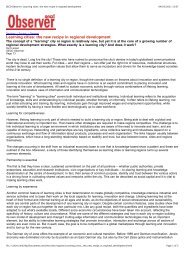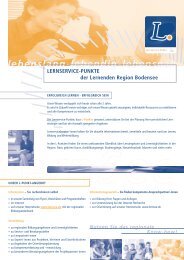Die Strategie für das Lebenslange Lernen ... - EUROlocal
Die Strategie für das Lebenslange Lernen ... - EUROlocal
Die Strategie für das Lebenslange Lernen ... - EUROlocal
Erfolgreiche ePaper selbst erstellen
Machen Sie aus Ihren PDF Publikationen ein blätterbares Flipbook mit unserer einzigartigen Google optimierten e-Paper Software.
142<br />
NEW LEARNING WORLDS<br />
Learning Network Three-Region-Corner (Schleswig-Holstein/Mecklenburg-West Pomerania/Lower Saxony)<br />
SME as an intercultural learning location<br />
I. Problem<br />
Working together productively in small enterprises is only<br />
possible when people understand each other. In this context,<br />
understanding not only means that people can speak<br />
the same language. Often people from different cultural<br />
backgrounds don’t even notice when they “talk at cross-purposes”,<br />
despite having good formal language comprehension.<br />
Different cultural backgrounds and values, mimic, gestures,<br />
habits, taboos, sensitivities, truisms, interpretation<br />
habits and much more can lead other people to misunderstood<br />
behaviour, diametrical assessment and possibly also to<br />
a false reaction.<br />
In order to avoid this it is not only important to be familiar<br />
with their colleague’s important foreign cultural characteristics,<br />
but also to be aware of one’s own cultural characteristics.<br />
II. Solution approach<br />
A well-functioning communication at the workplace is the<br />
key to success, especially when people from different cultures<br />
and different native languages work together. Mid-<br />
2003, we transformed the medium-sized enterprise PAULO<br />
(Ahrensburg) miniatures within the framework of our programme<br />
into a so-called “intercultural Learning and Learn<br />
enterprise” which wants to negotiate the appropriate education<br />
for the long-term unemployed and other socially disadvantaged<br />
people. That way the chances for reintegration<br />
into the unsupported job market are increased.<br />
People with different native languages and cultural roots<br />
work and learn here together.<br />
With the aim of creating a diversity management, we<br />
implement different practice-related tools from intercultural<br />
learning and working. Work-related language training<br />
for non-German speakers forms a part of this education programme<br />
as do courses for attaining intercultural behaviour<br />
competence in order to support the different cultures at the<br />
workplace. The most important tools are intercultural trainings<br />
for SME staff and management which are specially<br />
tailored to their operating procedures. People from outside<br />
the company can also “learn” by means of a practicum. So<br />
far direct modularly-built job-supported trainings are very<br />
promising ways to solve inner-company problems in the<br />
sense of the productive teamwork of different cultures. Such<br />
trainings can be aimed directly at the employees own cultural<br />
composition. The first experiences show that this very<br />
concrete relation is also essential for managers.<br />
III. Outlook<br />
Work is becoming scientifically supported, this includes<br />
business administration as well as ethnical, and the results<br />
will be included in a handbook for business practice in SMEs.<br />
This handbook will be offered nationwide together with specific<br />
education offers from the network partner “Centre for<br />
education and work” (Zentrum <strong>für</strong> Interkulturelle Bildung<br />
und Arbeit (ZIB) e.V.).<br />
www.drei-laender-eck.net


